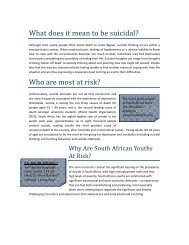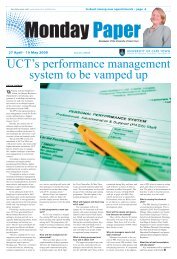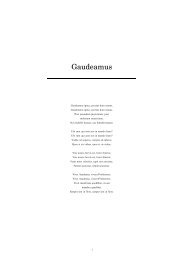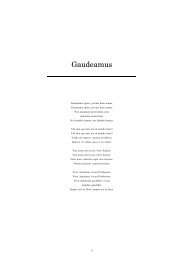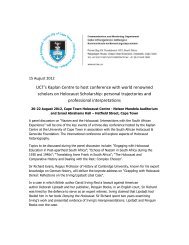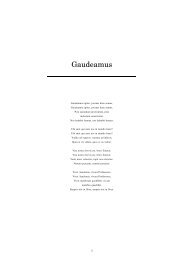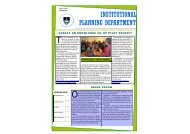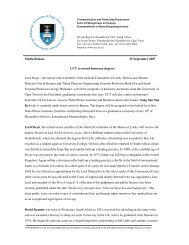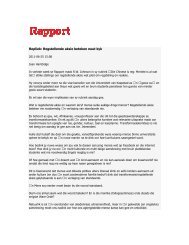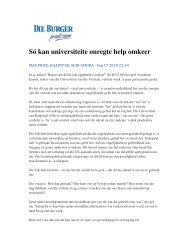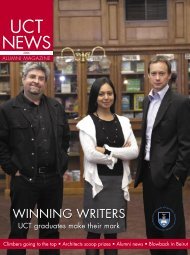uct heritage park management framework - University of Cape Town
uct heritage park management framework - University of Cape Town
uct heritage park management framework - University of Cape Town
Create successful ePaper yourself
Turn your PDF publications into a flip-book with our unique Google optimized e-Paper software.
25<br />
Planting<br />
• Reduce use <strong>of</strong> pesticides and adopt Integrated Pest Management principles and strategies<br />
• Reduce the use <strong>of</strong> chemical fertiliser and use organic fertiliser as a preferred option<br />
• Conserve topsoil<br />
• Plant waterwise lawns<br />
• Develop and adopt a Forest Management Plan<br />
• Propagate indigenous and endemic plants<br />
Landscaping<br />
• Adopt sustainable urban drainage practises by installing permeable surfaces where<br />
appropriate and replacing impermeable- with permeable surfaces where practical<br />
• Upgrade irrigation to surface drip technology (for planting beds only) and ensure these<br />
are only operated during low evaporation times, and only when soil moisture is low<br />
Infrastr<strong>uct</strong>ure<br />
• Install lighting controls at selected locations to activate lighting<br />
• Reduce light pollution through lighting design and best available/affordable technology<br />
• Investigate establishment <strong>of</strong> second storage dam on Table Mountain property in adjacent<br />
tributary<br />
Natural systems<br />
• Enhance biodiversity and ecological value<br />
• Ensure appropriate dry-season water flows to maintain natural streams on Upper campus<br />
Management<br />
• Implement and monitor Environmental Management Plan’s<br />
• Continue with clearing <strong>of</strong> invasive aliens<br />
• Continue with composting <strong>of</strong> horticultural/landscaping waste<br />
Land Use activities<br />
• Minimise <strong>park</strong>ing footprint to conserve landscape<br />
Proposals for the future development and maintenance and <strong>management</strong> <strong>of</strong> the site need to keep<br />
these broader strategies in mind if UCT are to keep to their commitment to fulfil the ideals <strong>of</strong> the<br />
Talloires Declaration, signed in 1990. The 2008 revision <strong>of</strong> the UCT Green Campus Policy<br />
Framework (Hall & Murray 2008) states:<br />
“With regards to achieving improvements in environmental performance related to<br />
institutional practice, the <strong>University</strong> <strong>of</strong> <strong>Cape</strong> <strong>Town</strong> will: …<br />
• “Manage and protect the university’s natural environment in a sustainable manner and<br />
enhancing the environmental quality <strong>of</strong> the estate to reflect the unique character <strong>of</strong> the<br />
indigenous flora and fauna”; and,<br />
• “Establish an integrated transport policy, which will provide improved facilities for<br />
disabled people and reduce the environmental impact associated with transport to and<br />
from UCT by encouraging the use <strong>of</strong> public transport, cycling, and walking”.<br />
2.3.16 Stormwater Management on Slopes Adjacent to Natural Areas, 2003<br />
This set <strong>of</strong> guidelines, prepared by the City’s Catchment, Stormwater and River Management<br />
Branch, was compiled to address gaps in the City’s 2002 publication “Stormwater Management<br />
and Planning Design Guidelines for New Developments”. The 2003 guidelines sought to address<br />
specific stormwater <strong>management</strong> issues at the natural / urban interface on the slopes <strong>of</strong> the <strong>Cape</strong><br />
UCT Heritage Park Management Framework: Final Draft Report, July 2012



